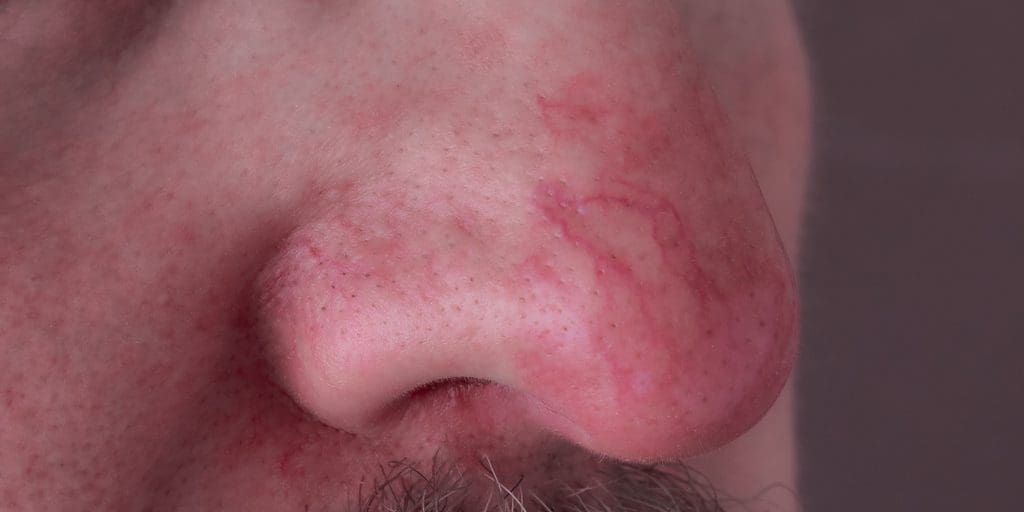A bulbous, red nose may go by many names, including “alcoholic nose.” This is because many people believe that chronic alcohol abuse can cause someone’s nose to turn red and disfigured. But is that really true, or is there another explanation for discolored, thickened skin on the face?
What Is Alcoholic Nose?

Alcoholic nose, otherwise known as “drinker’s nose” or “whiskey nose,” refers to an enlarged, red nose that some people associate with excessive alcohol consumption. In reality, it is due to a chronic skin condition called rosacea.
The redness occurs because of enlarged, “broken” blood vessels in the face. While not actually broken, the dilation of blood vessels makes them more visible and causes them to take on the appearance of fractured “spider veins.”
Besides a red, swollen nose, there are a few other symptoms of rosacea. These include:
- Eye irritation
- Rash
- Enlarged pores
- Thickened skin on the nose
In many cases, “alcoholic nose” is used to describe the most severe, end-stage form of rosacea, known as rhinophyma. Rhinophyma causes the nose to become even more disfigured due to the progressive dilation of the nasal vessels as well as the involvement of cysts and pustules.
Furthermore, because of the way people relate alcoholic nose to addiction, rosacea is often associated with feelings of shame and depression. Someone with rosacea who does not live with alcohol use issues may worry other people will make incorrect assumptions.
Alternatively, someone who suffers from alcohol addiction may feel like their rosacea is a constant, visible reminder of their struggles. Fortunately, it is possible to manage symptoms of rhinophyma to lessen their impact on daily life.
What Causes Alcoholic Nose?
Before discussing potential treatment options for alcoholic nose, it is important to understand whether or not alcohol itself is truly to blame. As it turns out, drinking alcohol (even in excessive amounts) has not been proven to directly cause rosacea.
At most, excessive drinking can increase someone’s risk of developing rosacea. However, it is not more or less impactful than any other risk factors, such as gender, age, skin tone, and family history. Someone who never drinks can have rosacea. Likewise, not everyone with an alcohol addiction develops rosacea, either.
Instead, alcohol can cause flare-ups in someone who already lives with rosacea. Consider the fact that even without the involvement of rosacea, flushed skin is a common side effect of alcohol. Drinking alcohol can also enlarge the pores of the skin, which can result in an influx of acne and other skin problems associated with alcoholic nose.
For these reasons, alcohol can aggravate symptoms of rosacea to a much more noticeable extent. Moreover, certain types of alcohol, like red wine, are more likely to trigger rosacea than others.
Non-Alcoholic Rosacea Triggers
Beyond alcohol, there are other potential triggers for rosacea flare-ups as well, such as:
- Strong emotions (especially anger, excitement, or embarrassment)
- Exercise
- Spicy foods or hot drinks
- Excessive exposure to sunlight and wind
- Certain cosmetic products
- Very hot or cold temperatures
Ultimately, drinking does not directly cause rosacea, despite it bearing the nickname “alcoholic nose.” In fact, scientists aren’t entirely sure why rosacea develops, but they do know that the risk factors mentioned above can contribute.
In any case, using the medical term for alcoholic nose is a helpful way to stop spreading misinformation and decrease the stigma surrounding rosacea. At the end of the day, it is just a skin disorder and should not be used to make assumptions about someone’s drinking habits.
How Is Alcoholic Nose Treated?

Rosacea has no cure, but that doesn’t mean there aren’t ways to manage its symptoms. Treatment goals focus on improving quality of life, preventing symptoms from worsening, and controlling flare-ups. For example, someone may treat their rosacea by:
- Using topical creams and ointments
- Prioritizing sun protection
- Cleaning their face gently and using mild soaps
- Learning and avoiding their triggers
Today, we’ll expand upon the importance of avoiding your triggers. If you think your drinking habits are causing your alcoholic nose flare-ups, know that the best way to stop them is to quit drinking.
Of course, due to the nature of addiction, this is often easier said than done. To give yourself the best chance of recovering and achieving long-term sobriety, consider seeking professional addiction treatment.
Alcohol Addiction Treatment
As mentioned previously, the best way to prevent rosacea flare-ups caused by alcohol consumption is to stop drinking alcohol. At Springbrook Behavioral Hospital, you can find the support you need to stop drinking for good.
We specialize in dual diagnosis treatment, meaning we are the best equipped to help individuals who have both substance use disorder and another mental illness. Co-occurring disorders like depression are common in people who battle addiction—especially if they experience alcoholic nose as well, because it can cause body image and self-esteem issues.
During addiction treatment, patients can expect to participate in a wide variety of evidence-based treatment options, such as:
- Individual therapy
- Group therapy
- Medication evaluation and management
- Family therapy
- Relapse prevention
- Discharge and aftercare planning
In addition, we offer detox services as part of our addiction recovery program. This is a great tool for those looking to stop drinking because of alcoholic nose. A medically supervised detox allows them to fully quit drinking in a safe, encouraging environment.
Get Help for Alcohol Addiction Today
If you live in Brooksville, Florida and need professional addiction treatment to help you stop drinking alcohol, Springbrook Behavioral Hospital can help. We are a mental health rehab center that specializes in supporting adults with co-occurring disorders, including alcohol use disorder.

